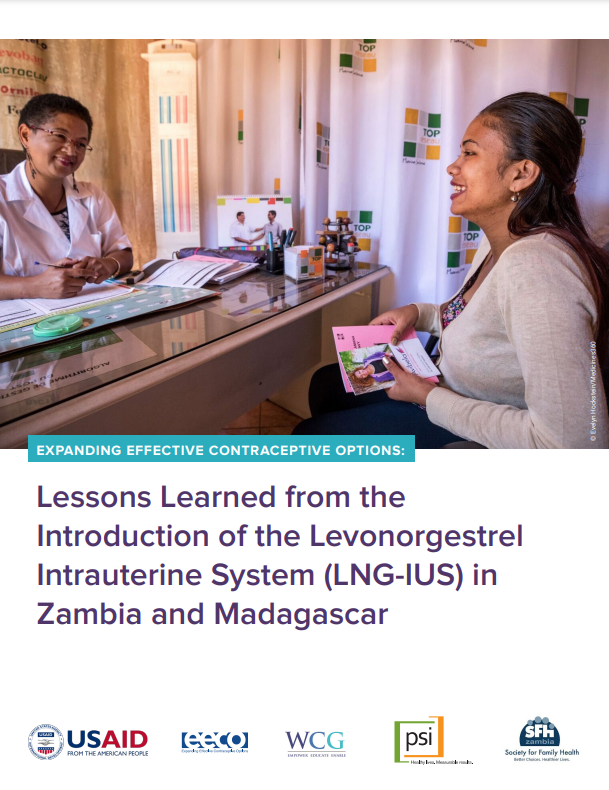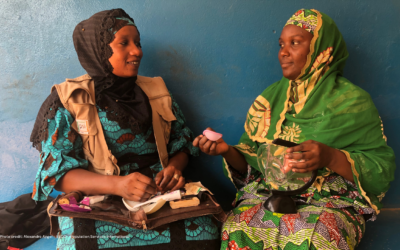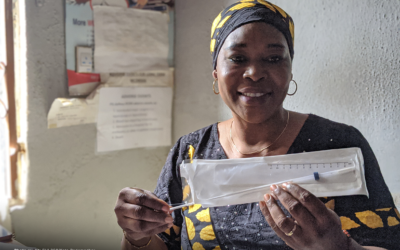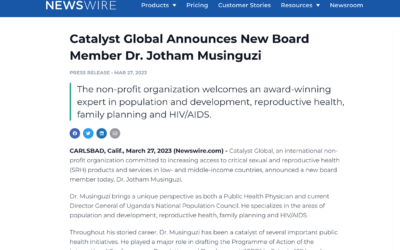By Kendal Danna, Technical Advisor, Reproductive Health, PSI and Ashley Jackson, Deputy Project Director, EECO, PSI
As a young woman in Madagascar studying to become a seamstress, Honorina didn’t want the stress of worrying about unintended pregnancy. She was already well aware of the complex choices women face to manage their reproductive health; many methods she had used before didn’t align with her personal preferences for family planning. She had tried the traditional rhythm method but worried that it didn’t provide enough protection. She had tried injectables but found it too inconvenient to visit the clinic every three months for another dose. Then, looking for effectiveness and convenience, Honorina tried the implant, but she found it difficult to manage the irregular spotting she experienced. None of these methods quite aligned with her needs, preferences, and lifestyle.
Finally, in 2018, Honorina found a method that was just right for her: the Levonorgestrel Intrauterine System (LNG-IUS or IUS). She chose the method after receiving counseling on the range of method options available in a clinic that receives training and support from PSI Madagascar. Honorina was attracted to the potential for lighter, predictable periods, as well as the peace of mind that the ease and effectiveness of the IUS would bring her.

“At first I was afraid to have something inside of my uterus, but now my period is regular again and I feel healthier.” – satisfied IUS client, Honorina (age 27)
Honorina is not unique in her struggle to find the right method for her. Different methods work for different clients depending on a client’s individual needs and priorities at a given time in her life. In Madagascar, preliminary data from a study led by the USAID-funded Expanding Effective Contraceptive Options (EECO) project shows that 100% of women choosing the IUS report that they have tried other methods, including traditional methods.[1] Other studies, such as those conducted by EECO and the USAID/SIFPO2 project in other countries, show similar patterns: 81% of IUS clients in Zambia[2] and 71% in Nigeria[3] have tried other contraceptive methods in the past.
Why do some women choose the IUS over other method options? This is a key question behind IUS pilot research in Nigeria, Madagascar, Zambia and Zimbabwe where, to date, over 550 IUS users have joined studies that will follow them over one year. USAID funds the EECO studies led by WCG Cares, PSI, and the Society for Family Health (SFH) Zambia as well as the SIFPO2 studies led by PSI and SFH Nigeria.
Initial findings of the studies reveal IUS users’ motivations for choosing the IUS:

– In Zambia, 53% switched to the IUS because of bleeding changes or side effects with their previous method.
– In Madagascar, 59% report that a desire for fewer side effects was a driver behind their decision to choose the method.[4] The low level of hormone released from the IUS is steady and slow, which minimizes side effects.[5]
– About one-third (34%) of users in Madagascar report that if the IUS had not been available on the day of their service they would have left with no modern method at all.[6]
This emerging evidence suggests that for many women, the IUS offers desirable method characteristics that differ from those of other options, even other long-acting reversible contraceptives.
The EECO and SIFPO2 projects are working with other partners—researchers, implementers, and donors—to understand how to make this unique product more available and affordable. The projects’ research findings in the coming year will contribute to answering the questions laid out in the LNG-IUS Working Group’s Global Learning Agenda.
To learn more about the EECO project’s pilot introduction of the IUS, check out this new program brief: Expanding Effective Contraceptive Options: Lessons Learned from the Introduction of the Levonorgestrel Intrauterine System (LNG-IUS) in Zambia and Madagascar. The brief is available in English and French.
[1] Finding based on data from the first 44 clients to join the study.
[2] Finding based on data from 154 clients at baseline
[3] Finding based on data from 208 clients at baseline
[4] Finding based on data from the first 44 clients to join the study.
[5] Hubacher, D. The Levonorgestrel Intrauterine System: Reasons to Expand Access to the Public Sector of Africa. Global Health: Science and Practice. 2015;3(4): 532–537. Available at: https://www.ncbi.nlm.nih.gov/pmc/articles/PMC4682579/
[6] Finding based on data from the first 44 clients to join the study.
Banner Image: (c) Evelyn Hockstein/Medicines360
Original post published by PSI: https://www.psi.org/2019/07/finding-her-contraceptive-match/




